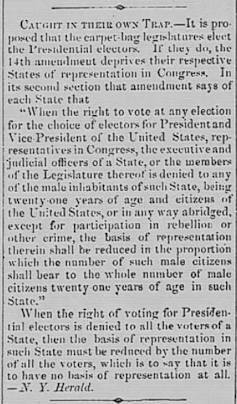The Dialog U.S. has had a number of articles explaining the historical past and results of america’ curious methodology of selecting a president, not with one nationwide election however with 51 smaller elections, in every state and Washington, D.C. Listed below are the highlights of that protection.
1. A safeguard for democracy
The Electoral School was the results of a compromise devised amongst 11 males on the Constitutional Conference within the sizzling Philadelphia summer time of 1787. It was meant as a protecting measure in opposition to rule by an uninformed mob, as Purdue College social research training professor Phillip J. VanFossen explains. He describes how electors got here to forged the decisive votes for president, writing:
“(The) founders were reassured that with this compromise system, neither public ignorance nor outside influence would affect the choice of a nation’s leader. They believed that the electors would ensure that only a qualified person became president. And they thought the Electoral College would serve as a check on a public who might be easily misled, especially by foreign governments.”
These 11 delegates to the Constitutional Conference in 1787 agreed on a compromise that created the Electoral School.
The Dialog, from Wikimedia Commons, CC BY-ND
2. Creating new hazard
Against this, although, Barry C. Burden, a political science scholar on the College of Wisconsin-Madison, discovered that relatively than defending American democracy, the Electoral School system created a brand new threat:
“Someone who wants to infiltrate the election system would have difficulty causing problems in a national popular vote because it is decided by thousands of disconnected local jurisdictions. In contrast, the Electoral College makes it convenient to sow mischief by only meddling in a few states widely seen as decisive.”
3. Defending the favored vote?

A information merchandise printed Aug. 19, 1868, in South Carolina gives perception in regards to the contemporaneous understanding of Part 2 of the 14th Modification.
The Anderson Intelligencer by way of newspapers.com
There could also be limits to that meddling, although. The Structure permits state legislatures to decide on the electors – which Donald Trump and his supporters tried to use in 2020 by asking Republican state legislators to nominate faux electors to confuse issues.
Nevertheless, as Eric Eisner, a historical past Ph.D. scholar at Johns Hopkins College, and David B. Froomkin, a regulation professor on the College of Houston Regulation Middle, clarify, that may have run afoul not solely of these states’ legal guidelines but additionally of one other provision of the Structure: The 14th Modification says that if a state disenfranchises any of its voters, that state loses a proportional quantity of its seats within the Home of Representatives.
So, Eisner and Froomkin clarify:
“(I)f a state legislature were to directly choose electors, that would disenfranchise all of the state’s voters. The right to vote, after all, is the right to have one’s vote counted, not the right to have one’s preferred candidate win. If all of a state’s voters have their right to vote taken away, Section 2 requires that the state’s House representation immediately and automatically be reduced to zero.”
That, in flip, means the state would solely have two electors – and would not be an element within the election.
4. Why does the US nonetheless have an Electoral School?
Different nations took a lead from the U.S. creation of the Electoral School, creating their very own variations. However they didn’t final, as Westminster School political scientist Joshua Holzer defined:
“None have been satisfied with the results. And except for the U.S., all have found other ways to choose their leaders.”
Many individuals within the U.S. even have issues with the Electoral School, and Holzer identifies one effort underway to exchange it with out amending the Structure. However even that wouldn’t be sure that the one who turns into president can be supported by at the least half of the individuals who forged ballots.



